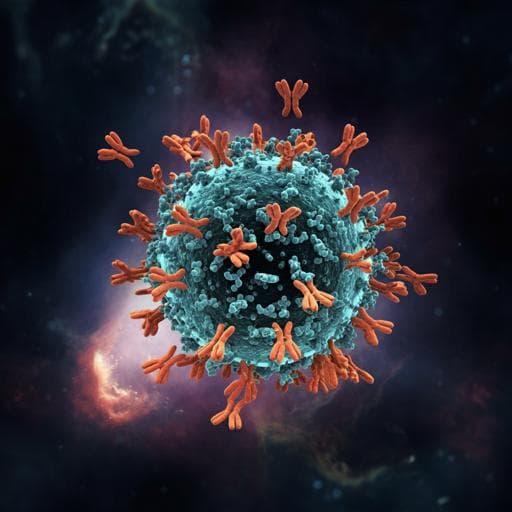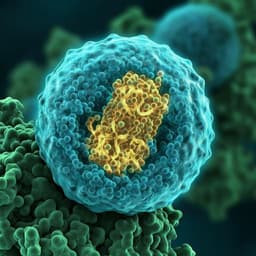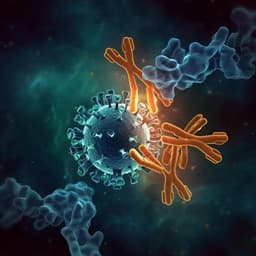
Medicine and Health
Immunogenicity and protection of a variant nanoparticle vaccine that confers broad neutralization against SARS-CoV-2 variants
J. Logue, R. M. Johnson, et al.
This groundbreaking study reveals that the recombinant prefusion-stabilized spike protein vaccine rS-Beta elicits a strong immune response in baboons against various SARS-CoV-2 variants, proving highly effective as a booster after NVX-CoV2373 vaccination. Authors James Logue, Robert M. Johnson, Nita Patel, and others conducted this pivotal research, suggesting a promising approach for combating future SARS-CoV-2 strains.
~3 min • Beginner • English
Introduction
The global spread of SARS-CoV-2 has been marked by the emergence of variants of concern (VOCs) with increased transmissibility and potential immune evasion. Alpha (B.1.1.7) exhibited greater transmissibility, while Beta (B.1.351) showed reduced susceptibility to neutralization by convalescent sera and some monoclonal antibodies. Subsequent VOCs, including Delta (B.1.617.2) and Omicron (B.1.529; BA.1/BA.5), further underscored the need for vaccines that maintain efficacy across evolving strains. The prototype Novavax vaccine NVX-CoV2373 (based on Wuhan-Hu-1) demonstrated high efficacy against Alpha, but reduced protection was observed in South Africa where Beta was prevalent. This study addresses whether a Beta variant-directed spike protein nanoparticle vaccine (rS-Beta), alone or as a booster following ancestral spike vaccination, can broaden neutralization and improve protection against diverse SARS-CoV-2 variants, including Omicron.
Literature Review
Prior clinical trials of NVX-CoV2373 showed strong immunogenicity and efficacy against ancestral and Alpha strains, but decreased effectiveness in settings dominated by Beta, which is known to evade certain monoclonal antibodies and exhibit reduced neutralization by convalescent/vaccine sera. Multiple studies have documented antigenic drift in coronaviruses and mapping of mutations that escape therapeutic antibodies. Experimental platforms presenting prefusion-stabilized spike or RBD on nanoparticles or other scaffolds have enhanced neutralizing responses compared with soluble antigens. Variant-matched boosters in other platforms (e.g., mRNA, adenoviral) have shown improved protection against VOCs in preclinical models and human immunogenicity studies. Collectively, this body of work motivates evaluation of variant-directed protein subunit vaccines, such as a Beta-based spike nanoparticle, to counter immune escape and provide broader cross-variant immunity.
Methodology
Vaccine antigens: The prototype NVX-CoV2373 spike (rS-Wu/WU1) is based on the SARS-CoV-2 Wuhan-Hu-1 sequence with a modified furin site (RRAR→QQAQ; 3Q) and prefusion stabilizing mutations K986P/V987P (2P). The Beta variant spike (rS-Beta; B.1.351) was similarly engineered with 3Q-2P mutations. Both were expressed in Sf9 cells using recombinant baculovirus, purified by TMAE anion-exchange and lentil lectin affinity chromatography, and formulated with Matrix-M adjuvant. Biophysical/biochemical characterization: Proteins were analyzed by SDS-PAGE and Western blot; thermal stability was assessed by differential scanning calorimetry; hACE2 binding was measured by bio-layer interferometry and ELISA (reporting EC50). Electron microscopy visualized trimeric prefusion spikes. Nonhuman primate study: Olive baboons (n=9; 2–3 per group) previously primed with rS-Wu plus Matrix-M (various doses) or unadjuvanted rS-Wu received a Beta spike booster approximately one year later (one or two doses of 3 µg rS-Beta + 50 µg Matrix-M). Serum was collected pre-boost and at multiple timepoints post-boost to measure anti-spike IgG, hACE2 receptor-inhibition titers, and neutralization by PRNT against WA1/2020, Alpha, Beta, Delta, and Omicron BA.1. PBMCs were used for ELISpot and ICS to profile Th1/Th2 cytokine responses and multifunctional CD4+ T cells. Mouse immunogenicity and challenge: Female BALB/c mice were immunized intramuscularly with rS-Wu and/or rS-Beta (1 µg per monovalent component; 2 µg total for bivalent) plus 5 µg Matrix-M on days 0 and 14 (or 21 for T-cell studies). Regimens included monovalent rS-Wu, monovalent rS-Beta, heterologous prime-boost (rS-Wu→rS-Beta), and bivalent (rS-Wu + rS-Beta). Sera were assayed by ELISA for anti-spike IgG, hACE2-binding inhibition, and virus neutralization by microneutralization. On study day 40, mice were intranasally challenged with Alpha or Beta variants. Outcomes included body weight monitoring, lung titers by plaque assay at days 2 and 4 post-infection, and viral sgRNA quantification by qRT-PCR. T-cell immunity was assessed by ELISpot (IFN-γ, IL-5) and ICS for multifunctional CD4+ Th1 cytokines (IFN-γ, IL-2, TNF-α), Tfh cells (PD-1+ CXCR5+ among CD4+), and germinal center B cell markers. Cross-neutralization panel: Additional groups (n=20/group) received variant-specific rS vaccines (WU1, Alpha, Beta, Gamma, Delta, Delta Plus) plus Matrix-M in a prime/boost on days 0 and 14; day 21 sera were tested for neutralization across multiple variants including Omicron BA.1 and for hACE2 inhibition against variant spikes. Statistical analysis: Group comparisons used one-way ANOVA with appropriate post hoc tests on log10-transformed titers where applicable; P ≤ 0.05 was considered significant.
Key Findings
Biophysical properties: rS-Beta exhibited higher thermal stability than rS-Wu (melting temperature approximately 79.8 °C vs 77.8 °C; P < 0.001) and comparable hACE2 binding affinity (ELISA EC50 ~8.0 ng/mL for rS-Beta vs 9.4 ng/mL for rS-Wu). Nonhuman primates: A single rS-Beta booster administered ~1 year after primary rS-Wu elicited a robust anamnestic anti-spike IgG response, often exceeding peak titers from the initial series within 7 days post-boost. hACE2-receptor inhibiting antibody titers rose markedly post-boost; neutralizing antibodies against multiple variants (WA1/2020, Alpha, Beta, Delta, Omicron BA.1) were undetectable pre-boost but became detectable post-boost. Multifunctional Th1 CD4+ T cells (triple positive for IFN-γ/IL-2/TNF-α) expanded after boosting. Mice immunogenicity: All vaccination regimens generated strong anti-spike IgG. rS-Beta-containing regimens (monovalent or bivalent) produced significantly higher hACE2-blocking titers against Beta than rS-Wu alone (e.g., 4.6-fold higher for monovalent rS-Beta vs rS-Wu; P < 0.0001). Neutralization: rS-Wu prime/boost yielded high titers against WA1/2020 but reduced activity against Beta and especially Omicron BA.1; including rS-Beta (monovalent, heterologous boost, or bivalent) increased neutralization against Beta and Omicron BA.1 while maintaining strong activity against WA1/2020. Protection in mice: Following Alpha challenge, placebo mice had ~1×10^4 PFU/lung at day 2, falling to undetectable by day 4; all vaccinated groups had undetectable lung virus at both days 2 and 4. Following Beta challenge, placebo mice had 2.96×10^6 PFU/lung at day 2 and ~2×10^1 PFU/lung by day 4; all vaccinated regimens resulted in undetectable lung virus at both timepoints, corresponding to >5-log reduction versus placebo at day 2. Vaccinated mice were protected from weight loss after Beta challenge; sgRNA levels in lungs were reduced by >99% versus placebo at day 2 for both Alpha and Beta challenges. T-cell responses: ELISpot and ICS indicated Th1-skewed cellular immunity, with increased IFN-γ responses and multifunctional CD4+ Th1 cells; Tfh and germinal center responses were evident. Cross-neutralization panel: Variant-specific rS vaccines induced cross-neutralizing antibody responses; notably, rS-Beta-immunized mice showed broad neutralization across Beta, Gamma, Delta, Delta Plus, and Omicron BA.1, and robust inhibition of spike–hACE2 interactions across variant spikes. In contrast, rS-Wu sera showed reduced neutralization and hACE2 inhibition against Omicron BA.1.
Discussion
The study demonstrates that a Beta variant-matched spike nanoparticle vaccine broadens humoral and cellular immunity beyond that induced by an ancestral spike vaccine alone. As a booster, rS-Beta rapidly reactivated memory responses in nonhuman primates and expanded neutralization breadth to include Beta, Delta, and Omicron BA.1. In mice, inclusion of rS-Beta (either alone, heterologous boost, or bivalent with rS-Wu) enhanced neutralizing titers against immune-evasive variants while preserving strong activity against ancestral virus, and conferred sterilizing protection in lungs following Alpha or Beta challenge. The Th1-biased cellular immunity and Tfh/germinal center responses support quality of the antibody response. These findings address the central question of whether variant-directed subunit vaccines can counteract immune escape and provide forward-looking protection; the data suggest that a Beta-directed formulation can serve as an effective booster to broaden coverage against circulating and emerging variants.
Conclusion
A recombinant Beta (B.1.351) spike nanoparticle vaccine formulated with Matrix-M adjuvant shows favorable biophysical properties, strong immunogenicity, and broad cross-variant neutralization in mice, with complete protection against Alpha and Beta lung replication, and elicits a potent anamnestic and multifunctional T cell response as a booster in nonhuman primates. Incorporating a Beta antigen, either as a monovalent booster or as part of a bivalent regimen with ancestral spike, increases neutralization breadth to include Omicron BA.1 while maintaining activity against ancestral strains. These results support the use of variant-matched protein subunit boosters to enhance breadth of immunity as SARS-CoV-2 evolves. Future work should evaluate clinical immunogenicity and effectiveness of Beta-directed (and other variant-directed) boosters in humans, assess durability and dose-sparing, optimize mono- versus multivalent formulations, and extend testing to newer sublineages.
Limitations
Baboons were studied in small groups (n=2–3), limiting statistical power and precise quantitation; a second rS-Beta booster did not appear to add benefit, but sample sizes were insufficient for definitive conclusions. Mouse challenge models may not fully recapitulate human disease; Alpha replicates inefficiently in standard BALB/c mice, reducing power for some comparisons. Vaccine doses in animal models were higher on a per-weight basis than human dosing, complicating direct translational comparisons. The study did not include human clinical efficacy or effectiveness data. Cross-neutralization against later-emerging Omicron sublineages beyond BA.1 was not assessed.
Related Publications
Explore these studies to deepen your understanding of the subject.







